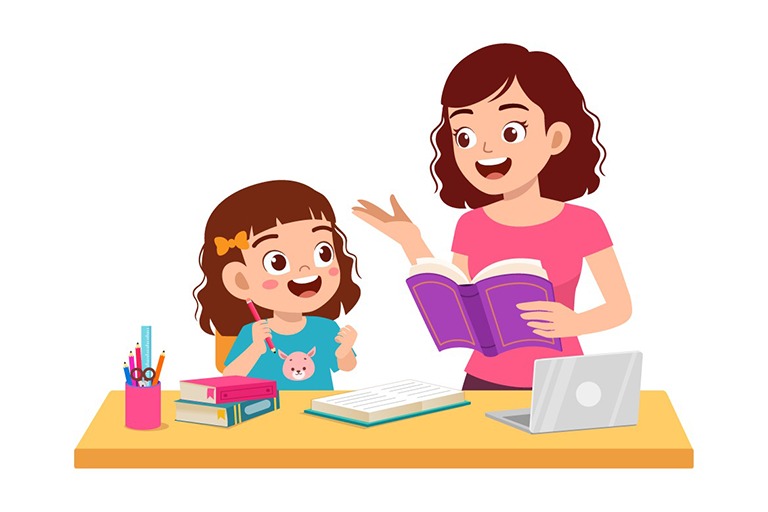EFFECTIVE PARENTING SKILL
Practical Parenting is the ability to use what you have to make the child-caregiver relationship enjoyable. This type of parenting is little to no cost and takes a little time, effort, and of course a lot of patience and practice.
Let us delve deep into one of the trickiest effective parenting skills i.e.,
to maintaining a balance between authority and friendship
The first thing that is to be done here is to sit down and have a family discussion on the family rules in your home. Let your child know the consequences that s/he has to face if rules are broken. Rules should be few, fair, easy to follow, enforceable, and positively stated. If your child misbehaves, stay calm and give her/him clear instructions to stop misbehaving and tell the child what you would like her/him to do instead. For example, “Stop talking. Finish your meals first.” And appreciate your child if s/he follows your instructions. For example, “Thank you for finishing your food or thank you for being such a wonderful child.”
Let’s discuss a few examples
to understand this skill of maintaining balance
Some parents are strict and controlling and believe parents are higher in the hierarchy and it cannot be an equal relationship. They make two mistakes. Firstly, according to them, the ideal family is one where the kids blindly follow all household rules and to a certain extent even fear the parent. Secondly, to maintain this position of authority or to be higher in the hierarchy they use distance as a tool. They believe distance is necessary to maintain fear, discipline, and respect. Becoming nice and friendly would give the wrong message and that would dilute control.
But in the long run, this strategy turns out to be a mistake because as the youngster gets older s/he begins to answer back. Now the authority is gone, and friendship was never established. So, certainly, this should be avoided. Wisdom is about balance. Become both a friend and a mentor. You can balance friendship and authority in one scene. Let us discuss an example of how to practice it.
The family is going out for a meal. What time to go and come back, can be decided by the parents, like an authority. However, kids can participate equally in choosing where to go, just like a friend. The idea is, that to be a good parent, one must exercise authority while still giving one’s child as much freedom and openness as possible. You as a parent have to balance the role of friendship and authority.
Now we will discuss, as a parent how I can maintain authority in rule-based decisions like- no junk food on weekdays, no mobile phones after 8 pm, or you cannot stay out with your friends after 9 PM.
Firstly, calmly and firmly state your decision, clearly with reasons. For example, no mobile phone after 8 pm, because it is distracting, addictive, not good for your eyes and it will disturb your sleep. Reasons make you sound reasonable and not irrational. And hence increase your credibility and create trust. When you give a reason, the child is less likely to get offended. They won’t take it personally. If your reasons are like “do this because, I said so”, or “do that because I do it that way” then, I am sorry these are not good reasons to pursue the authority. Give reasons which can be validated by other people as well.
Secondly, when you give decisions, it’s likely that the child will resist or answer back. Children might even say nasty and hurtful things. So, how to handle these kinds of situations?
- Calmly and firmly, stand your ground, look into their eyes, and speak politely- “These reactions are not acceptable, you need to talk respectfully, if you talk like this, I won’t even consider your request”.
- Say this, you might have to repeat these statements a few times and then wait. Give them a look at how this is unacceptable and there are going to be consequences.
- By this, the child will understand that “I cannot scare my parents. My anger and tantrums won’t budge them, and they won’t accept this attitude.”
- The very important thing here is that, don’t add fuel to the fire. Hold on, let them say whatever they want, and do not lose control in the moment. Do not raise your voice. Show them that you are really strong.
- If they don’t talk nicely to you even after waiting for 10 minutes. Walk away. They will come to you because the decision is in your hands.
Thirdly, do not change your decision unless they give a better reason and talk nicely. Stick to your decision calmly and firmly. By this child will realize, “The only way to convince my parents is with better reasons, spoken nicely. Not with force, anger, or violence.” The good thing about this is, that when children see no scope for negotiation, they accept and adapt. But if you leave loopholes, they find a way to break the rules. So, follow through on your decisions with full force.
Fourthly, make sure to make them apologize for their disrespectful behavior, provided you have not said anything bad at the time when your child was throwing tantrums. Because if you have, then you lose your moral high ground. If you have stayed calm and firm throughout, at the end again with that calmness and firmness, make them apologize for their impolite behavior. If they don’t, stop everything. By everything here, I mean their necessities are parents’ duty but their luxury is not. So, all necessities are to be fulfilled but not the luxuries.
Don’t leave the topic until they apologize. If they run to their rooms, stop talking to you for a few hours, or throw tantrums, that’s okay, let them. Whenever they talk next, make sure that they apologize sincerely first. Through this, the child will get a very clear message, that, “If I become disrespectful to my mom and dad, I will not get anything from them.”
Fifthly, if they still break your decision or if they still talk to you disrespectfully, then think of some sort of mild punishment that is in your control like no TV for one day, outing plan canceled, or no ice cream after dinner. Pick your punishments based on your household and child’s age.
But I repeat, punishment should be short in time, it should be mild, and avoid giving unreasonable punishment like, “from now on you cannot meet your friend ever again.” Now, what if they disregard your punishment? That’s where it becomes a loop, then follow all the steps again, and if the situation demands make the punishment a little higher this time, like no TV for 5 days, no outings for this month. Or if you feel you need help you may seek professional guidance from the counselor. Ideally, punishment should be a very small part of your parenting. Only when necessary and as rarely as possible.
Finally, the moment your child apologizes sincerely for being disrespectful become normal immediately, act, as if nothing happened, and tell them how much you love them. Here, I would like to elaborate on the point of sincere apologies from the child. If your child comes to you and says sorry and hugs you, or kisses you or sits in your lap might mean the child is trying to convey I love you and I am sorry. As a parent, you can understand the gestures better and respond accordingly.
Here, I would like to share one case, one of my clients’ daughter tried to scare her parents by not eating food for two days. Her parents told her, “if you will fall sick, we will take you to the doctor, and we will admit you to the hospital. But you have to follow the rules. And when this girl accepted to follow the family rules, her parents started a normal conversation, and they had their lunch together”.
So, the idea is, that the child should clearly understand, they cannot overrule your decisions, and they cannot disrespect mom and dad. You will need strength against your child! When strength is used with anger, it becomes toxic, but when strength is used with calmness and good reasons it becomes a blessing!
Watch here: TRICKY LOVEFUL PARENTING
Learn more: Parenting Skills
Pooja Kapoor (A Research Scholar), Counsellor & Hypnotherapist, YOUR Confidant





